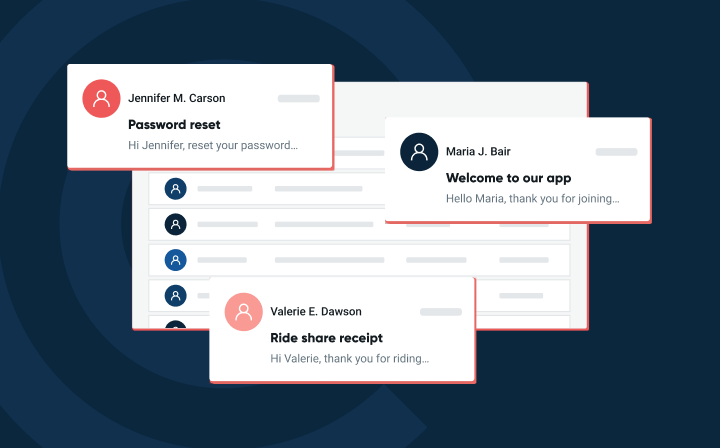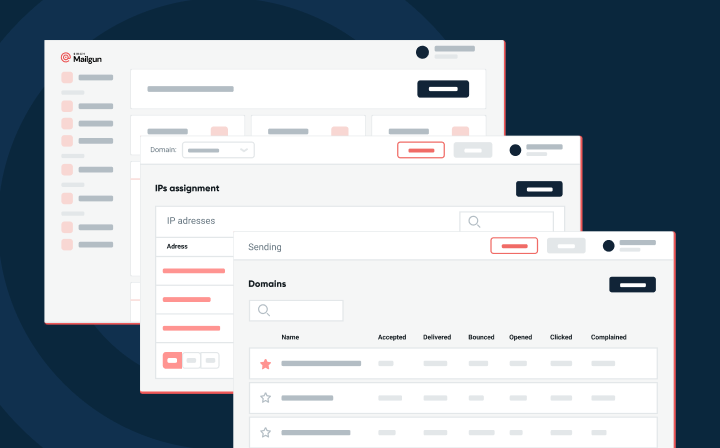Deliverability
Here’s everything you need to know about DNS blocklists
What is a blocklist? And how do you avoid them? Stick around to learn about blocklists and how to avoid their drama, how DNS blocklists work, what to do if you’re on a blocklist, and how to avoid being put on a blocklist in the first place.
PUBLISHED ON
The word “blocklist” can almost seem like something out of a movie – a little dramatic, silly, and a little unreal. Unfortunately, in the real world, blocklists are definitely something you need to be mindful of, especially when it comes to an email program.
In this article, we’ll tell you a little more about blocklists and how to avoid their drama. Specifically, we’ll go over how DNS blocklists work, what to do if you’re on a blocklist, and how to avoid being put on a blocklist in the first place.
Table of content
What is a blocklist anyway?
Before we run through the different types of email blocklists, let’s cover what blocklists are. DNS-based blocklists (DNSBL) and real-time blocklists (RBL) are lists of IP addresses that are suspected of sending spam and are used to prevent unwanted email messages from reaching unsuspecting recipients. Domain name system (DNS)-based blocklists are based – as the name suggests – on their listed IP addresses’ domain names. RBL are based on IP addresses that are caught in real-time. Simple, right?
Why was the DNS blocklist server list created?
The DNS blocklist server list was created as an anti-spam mechanism, basically like AdBlock or AdGuard for your emails. Because of its creation, email providers could have a resource to see which IP addresses had a reputation for sending unwanted or malicious emails to recipients. They could use this list (and later, other lists like the RBL) to take effective action against spammers without harming normal ISPs. An important thing to note is that blocklists don’t actually block your messages – the mailbox providers do.
How do DNS blocklists work?
Alright, this is a bit of a tag-team effort. First, DNS blocklists flag your email messages based on certain factors. For instance, you might have a bad IP reputation or domain reputation. Or, you might be suddenly sending a high volume of email traffic. Or, your content might look like it contains malware or is a phishing attempt.
Then, email clients like Gmail and Microsoft Outlook use this information from DNS blocklist services along with internal metrics to decide whether to block your message.
Why is this important? Well, just being listed on a random blocklist isn’t necessarily going to cause problems with your email deliverability. However, if you hit these mailbox providers’ metrics and show up on some more reputable blocklists, that’s when you run into problems.
Which blocklists matter?
There are a lot of blocklists out there, and we mean a lot: check here to see how many. These are created by large, reputable businesses, as well as lesser-known companies and sometimes fraudsters. Since pretty much anyone can create a blocklist, they aren’t all treated the same by email providers – and you should focus on paying attention to the ones that matter most.
So as an email sender, how do you decipher between the reputable blocklists and the fraudsters? Don’t fret. We’ve saved you some time digging through information on GitHub or StackOverflow, and here’s our shortlist of some of the most reputable blocklists:
How do I know if I’m on a blocklist?
Your emails aren’t going through. The thought flits through your head: Am I blocked?
If you’ve landed on a DNS blocklist, the blocklist vendor will usually send you a message informing you of your listing. However, if you suspect you’ve been blocklisted, you can always manually check major blocklists to see if your domain name appears on their list.
Of course, if you’re using Mailgun as your email service provider (ESP), you can take advantage of our Blocklist Monitoring Service. We’ll do all the heavy-lifting for you and monitor in real time whether you’re on a blocklist.
How can I get off an email blocklist?
So you’re on a blocklist. Don’t worry; it’s not the end of the world.
To get off a blocklist, follow these three easy steps:
Check the blocklist vendor’s email informing you of your listing. They usually provide information on why you were blocklisted.
Follow the blocklist vendor’s instructions to clean up your email practices.
Put in a blocklist removal request. Keep in mind that some ESPs, like Mailgun, will step in on your behalf to work with the blocklist vendor and speed up your delisting.
If you don’t take necessary measures to prevent a re-listing, you will get listed again, guaranteed. Frequent recurrences could lead to future removal requests being rejected, so fix your email problems before you’re listed again. Your ESP will be happy to see you off the blocklist for good.
How do you avoid being put on a blocklist?
A word of caution: even if being put on a certain blocklist seems inconsequential, the fact remains that something in your email program caused your blocklisting to happen in the first place.
Maintain best practices when it comes to your email program. Oftentimes, blocklists happen because you send a message to a spam trap monitored by one of these blocklist operators.
If you do happen to get listed, take a close look at your email list collection practices. Here’re some of our suggestions:
Use double opt-in: Incorporate some form of double opt-in or email validation into your sign-up process. Email verification can help weed out bad emails and ensure you’re sending to real, interested consumers. And, always keep up with your email list hygiene.
Check how you’re sending: It makes a big difference if you’re sending from a shared mail server or IP versus your own dedicated IP address.
Go over your email content: Are you using many exclamation marks, spammy words, capitalizations, or emojis that look spammy to a blocklist service provider? Are you sending an all-image email?
Avoid large email sizes: Check your HTML email template to ensure your code is optimized. Spam filters often flag large emails as spam.
Wrapping up
And that’s a wrap on blocklists. They’re a simple yet painful concept, and ignoring email best practices can leave you open to being put on one or more of them.
Mailgun has a variety of services that help boost your deliverability and reputation and prevent blocklisting, like email validation and SMTP relay, among others. The important thing is, no matter how you choose to use your email program, make sure you avoid blocklists and stay above the drama.
If this was helpful, you’re in luck. At Mailgun we like to break down every aspect of email from blocklists to deliverability. Subscribe to our newsletter and become email geeks like us.






